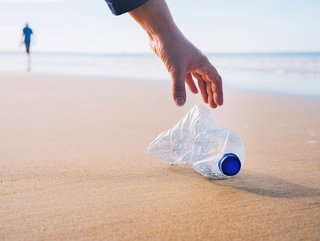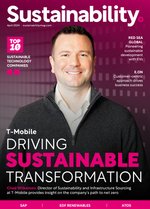Is Digital Watermarking the Future of Plastic Recycling?

Despite being invented only a little over a century ago, plastic is everywhere. Since the development of Bakelite by Leo Baekeland in 1907, materials such as perspex, polyethylene, nylon, teflon and more can be found in electronics, textiles and homeware, as well as healthcare, construction and other crucial industries.
Despite the many benefits of the materials, plastic pollution is a global issue. The equivalent of 2,000 garbage trucks full of plastic are dumped into the world's oceans, rivers, and lakes every day, reports the United Nations Environment Programme. This equates to 360 million tonnes of plastic waste generated annually — 50% from packaging, and 30% from construction, industry, and agriculture plastic waste.
The Alliance to End Plastic Waste
Global non-profit organisation the Alliance to End Plastic Waste is working to support the transition towards a plastic circular economy. The Alliance funds and supports projects across the entire plastic value chain – from the design stage to end-of-life waste management and recycling solutions – in its efforts to end plastic waste leakage into the environment.
The Alliance seeks to develop solution models that are environmentally and socially beneficial, economically feasible, and most of all, highly replicable – all targeted at eliminating leakage and enabling plastic circularity.
“Think of us as a global laboratory that de-risks and demonstrates innovative new approaches on a commercial scale,” says Martyn Tickner, Chief Advisor, Circular Solutions, Alliance to End Plastic Waste.
The Alliance is working to boost confidence in innovation by using its capital to de-risk projects, encouraging commercial capital to continue the process of scaling and/or replicating viable solutions. Rather than the typical finance return, the Alliance seeks to create an impact return through making grants or concessional loans designed to de-risk the investment for other proven solutions.
In order to support and develop the necessary new finance mechanisms to accelerate the transition to plastics circularity, the Alliance has partnered with Lombard Odier Investment Managers to launch an impact private equity fund that supports enterprises committed to reducing environmental pollution and greenhouse gas emissions from the plastic value chain. Since inception in May 2022, the Plastic Circularity Fund has secured private equity capital from institutional and other accredited investors including Alliance members. In addition to being a seed investor, the Alliance acts as a technical advisor during the fund’s five-year investment phase.
HolyGrail 2.0: Digitalised recycling
The Alliance is funding and backing a project to increase the amount of plastic that is recycled, which is currently only 10%. The HolyGrail 2.0 project is developing digital watermarks – imperceptible postage stamp-sized codes printed on plastic packaging – that carry information about the packaging material. As plastic waste enters a recycling centre, high-resolution cameras installed at sorting units can easily detect and decode this information and accurately sort the plastic waste.
“As an organisation dedicated to improving waste management systems and increasing recycling rates, the Alliance recognises HolyGrail 2.0’s digital watermarking technology as a strategic long-term choice towards the digitalisation of plastic usage, providing traceability of packaging from put-on-market to received-at-a-recycling-facility, and enabling high-precision sorting,” shares Tickner.
“The technology could revolutionise a vital part of the waste management chain, demonstrating the potential to vastly improve sorting accuracy, with recent semi-industrial trials showing a 99% detection rate and a 93% to 95% purity of sorted materials. With this level of accuracy, the initiative is capable of significantly improving the quality of input materials for recycling into high value applications and ultimately, increasing recycling rates.
“Far from an incremental development, digital watermarking not only enables advanced sortation for higher recycling but also could provide traceability for the purposes of digital product passports, Extended Producer Responsibility (EPR) fee formulations, as well as consumer information and retail check-out. This can go beyond fast-moving consumer goods (FMCG) packaging. For example, imagine replacing pharmaceutical leaflets, electronic equipment installation instructions, or user manuals with a quick scan of a smartphone camera.”
The HolyGrail initiative is driven by AIM – the European Brands Association – and a broad spectrum of leading companies representing the full value chain including Procter & Gamble (P&G), Henkel, PepsiCo, Veolia and Pellenc ST.
“Leading and participating in HolyGrail is an effort from P&G to help advance sustainable solutions for industry,” says Gian De Belder, Technical Director, R&D Sustainable Packaging, P&G.
“It has been a multi-year effort to create an industry-wide approach addressing a key barrier to recycling success – effective sortation. P&G is seeking scaled solutions that address key consumer sustainability challenges and which ensure our products are irresistibly sustainable.”
The technology is being piloted currently in France as the team works to prove the value creation potential towards the stakeholders.
The future of plastic pollution
It is no secret that climate change is currently accelerating faster than is sustainable, and plastic pollution is part of the problem. HolyGrail 2.0 has already validated the technical viability of using digital watermarking in the waste management value chain and shown its value as a developing technology working to reduce plastic pollution.
“The challenge now is to demonstrate the business benefits of digitalisation, as market adoption at scale is key to the success of any product or solution model,” says Tickner.
“Leading consumer goods players such as Procter & Gamble are crucial participants in the pilot implementation happening in early-adoption markets. They have the scale, resources, and strategic vision required to not only launch a critical mass of digitally-marked products in the market, but also enable or justify a business case for recyclers to invest in the additional equipment needed to detect and benefit from improved sortation.”
Whilst digital watermarking is an exciting and innovative solution to a global issue, the team agrees that it is not a complete solution.
“It is likely no one sortation tool will be 100% effective, so a combination of approaches is likely to yield the best results,” adds De Belder.
“It truly depends on how granular the industry/stakeholders want to be: digital watermarks provide the highest granularity levels of any technology, as each product has its own digital identity that can be used for several purposes, including sortation.”
“Ultimately, digital watermarking is just one of the innovative solutions needed to help countries and plastics producers meet ambitious recycling targets set, and in this respect, meet increasingly stringent disclosure requirements,” concludes Tickner.
“But we need to overcome the chicken-and-egg situation we face on so many fronts, where recyclers do not invest because the market value is not clear, yet the market value is not clear because there is not enough critical mass of high-quality recycling operations.”
******
Make sure you check out the latest edition of Sustainability Magazine and also sign up to our global conference series - Sustainability LIVE 2024
******
Sustainability Magazine is a BizClik brand







